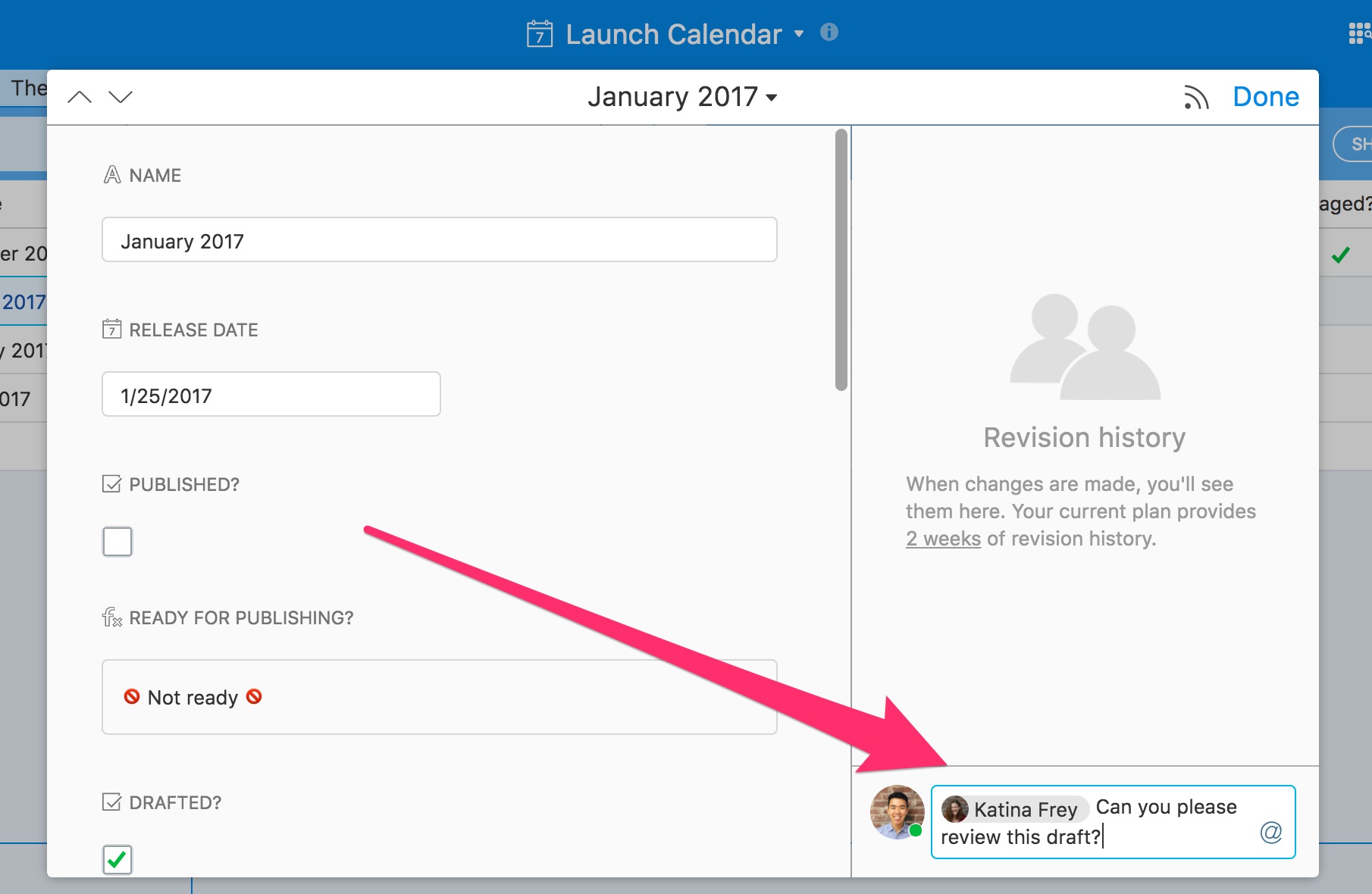We’ve explored what Airtable is and discussed some of its functions. Now it’s time to dive into how Airtable can help your business.
The best way to do this is to look at how other companies have adapted Airtable’s software for their operations. If you know how other businesses are using Airtable to increase their efficiency, you can gather the best of these ideas and mold them to your needs.
Who benefits from Airtable?
In the years since launching, Airtable has maintained its popularity. We already mentioned that Tesla uses Airtable for inventory tracking. WeWork uses it to sort customer feedback. That’s the great thing about Airtable — you can beef it up or down depending on what you need it to do.
Airtable’s different pricing plans offer services at an affordable cost. Plus, the platform features hundreds of templates specifically designed for various businesses, including startups, nonprofits, publishing houses, and more. In fact, the amount of ground Airtable covers is so vast that it’s worth exploring in more detail.
Here are some of the different industries and business functions that Airtable is involved with.
Product launches
Introducing a new product in your business can be scary. Organization is key, and you need to make sure everyone on your team is on message.
Airtable’s product launch template is designed to make sure that you keep everything in order, from the beginning of the process right up until liftoff. Whether you work for a small company introducing a new aspect of your business or a startup showing off the second phase of your development, Airtable can morph to fit your needs. You can even use the template for smaller projects like a press release.
As to the features of this template, collaboration is the name of the game. Each member of your team can personalize their view of internal records around their respective tasks. This keeps things in order and sets clear lines of responsibility from one part of your team to another. Your sales team probably has different priorities than your production team, and Airtable allows for this separation.

Airtable also has what’s known as a “kanban view,” which allows you to divide tasks into cards, creating a clear visual of the items you have to complete. Plus, in the workflow stages, you can view launch dates as a calendar and check off each task as it’s completed. You can also mention members of your team to notify them of certain problems or things left to do to ensure a streamlined launch.
Social media planning
A lot of thought goes into a social media post. You have to keep the copy punchy. You also have to think about the image you’re going to include in the post and how it will reach and attract users. Then you must plan around the platform or platforms you’re publishing on to meet the different nuances of each.
With Airtable’s social media planning and design template, you can arrange and organize all of these things in one place. Social media planning is a group project — the content that a company posts often comes from its marketing team, and there’s communication that has to happen between the editorial and marketing teams. Airtable’s interface allows for easy collaboration to make sure everyone’s on the same page.
Here’s how it works: You can track and store future ideas for images or copy that might be useful if you know ahead of time that you’ll be rolling out a new product or service. Airtable’s assets table keeps everything in one place and retroactively acts as a reference database for what you’ve done, which can help you plan your next project. Your team can also add suggestions, making your business’s social media planning a true group effort.
Airtable even offers a preview screen to show exactly how your post will appear to your users, giving you a chance to put yourself in their shoes and consider how they might absorb what you post.
Content production and publishing
The publishing industry is known for hustle and bustle. Online publications often publish five to six pieces of content or more daily, and most magazines publish an issue or more per month.
Keeping track of these posts and issues — and who’s responsible for writing or posting them — can get messy. Airtable’s editorial calendar and content production template is specifically designed to help avoid disorganization.
With this template, publishers can piece together all of their print and online assets in one place, creating a master calendar that lists everything they’re set to publish in a day, week, or month. Editors can use the template to plan future issues and brainstorm content ideas. And Airtable’s view options enable writers to keep track of their individual assignments and deadlines.
Airtable also includes features within this template for broader editorial functions like categorizing your best-performing articles and planning your media kit for the upcoming year. Understanding how your team works best and how your audience is responding to the work you put out is the backbone of a successful publication.
Advertising campaigns
If you’re in advertising, you probably love the fun parts of the job — working with a team, being creative, and thinking of new ideas to market products to consumers. Unfortunately, as with most businesses, there’s also grunt work involved. And if you don’t do this work, your creative process is going to be stunted.
Airtable’s advertising campaign tracking template allows companies to keep track of their projects, big and small. You can stay on top of each platform your team might target, and you can connect with Google Analytics to compare and contrast page views and make connections between your strategies and overall metrics.
Airtable’s Ad Sets & Creatives tables allow you to easily update your numbers and statistics with its automatic formula fields, so you can take the manual processing out of the equation.
Your entire campaign can begin and end on Airtable, including the planning, design, and execution phases. You’re at the controls in updating project status throughout, and you can get hyper-specific in assigning tasks for certain deadlines and assets to keep everything easy to understand.
Software companies
Airtable has adapted a mantra when it comes to assisting with your product and software development: agility. Its product design and workflow template is based on operating with an “agile methodology.”
This means putting customer needs first in design, development, and product improvements. It also means eliminating unnecessary steps — being aware of what your customers want and only focusing on these things is a great way to stay focused and not veer off into unrelated territory.
But Airtable doesn’t stop there when it comes to product design. Its bug and issue tracker can work in tandem with product tracking to ensure you’re organized and that any issues you catch in the process are dealt with.
Airtable’s bug tracking template makes delegation simple. The template includes a form to record the specifics of your problems so that everyone on your team is aware of what needs to be done. Airtable’s bug filters also create classifications for anything you encounter, giving you the tools to mark the most critical problems.
Event planning
Holding events is a great way to meet your customers face to face and gather input about what they do and don’t like about your business. But staging these events involves a lot of moving parts and tons of planning.
With Airtable’s event management platform, you can manage every aspect of your event and assign roles to everyone on your team. (You can also use Airtable to create job posting forms if you find you need extra sets of hands.)
Just like Airtable’s other templates, each person involved with your planning can customize their view of your database to make sure they know what’s expected of them day to day, who they’re working with, and where they’re supposed to be.
Nonprofits
Building a nonprofit from scratch takes dedication. There’s a significant amount of outreach required — and you have to document every component. That’s why a resource like Airtable is invaluable.
Airtable’s nonprofit templates can help you track donors, grants, donations, and much more. For larger nonprofits, Airtable’s enterprise scaling makes something that might seem overwhelming far more manageable.
Say you’re holding an all-day fundraiser, and your employees are stationed across the city. With Airtable’s mobile capabilities, you can access information on the go through your mobile device and ensure everything goes off without a hitch.
When you’re running a nonprofit, everything needs to be as organized as possible, so you can keep the focus on your cause. Airtable is all about adaptability, giving you everything you need to build a template from the ground up and shape your needs around its services.
Whatever you need, on demand
Airtable knows that what you need out of a database or spreadsheet is going to vary based on your industry — so it makes sure that whatever your operations entail, it has a template for you. Whether you’re planning a charity gala, running a nonprofit, or both, Airtable is there to smooth your processes and create a centralized place for your internal and external operations.
Now that we’ve learned about Airtable’s benefits and all of the different businesses that can take advantage of its services, let’s break down how Airtable can help you with a specific project.
Photo by Kristin Wilson on Unsplash







































































Send Comment: